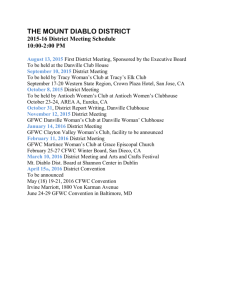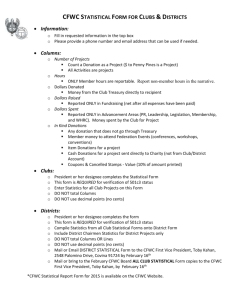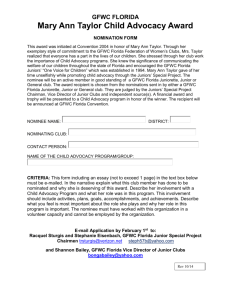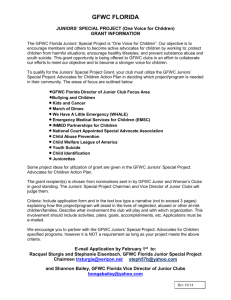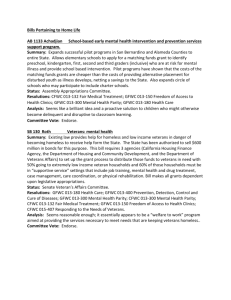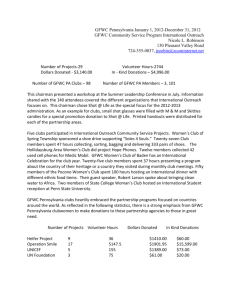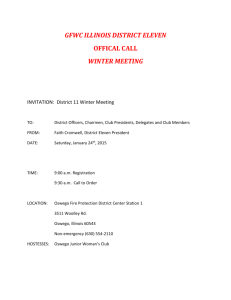Home Life Textbook Final
advertisement
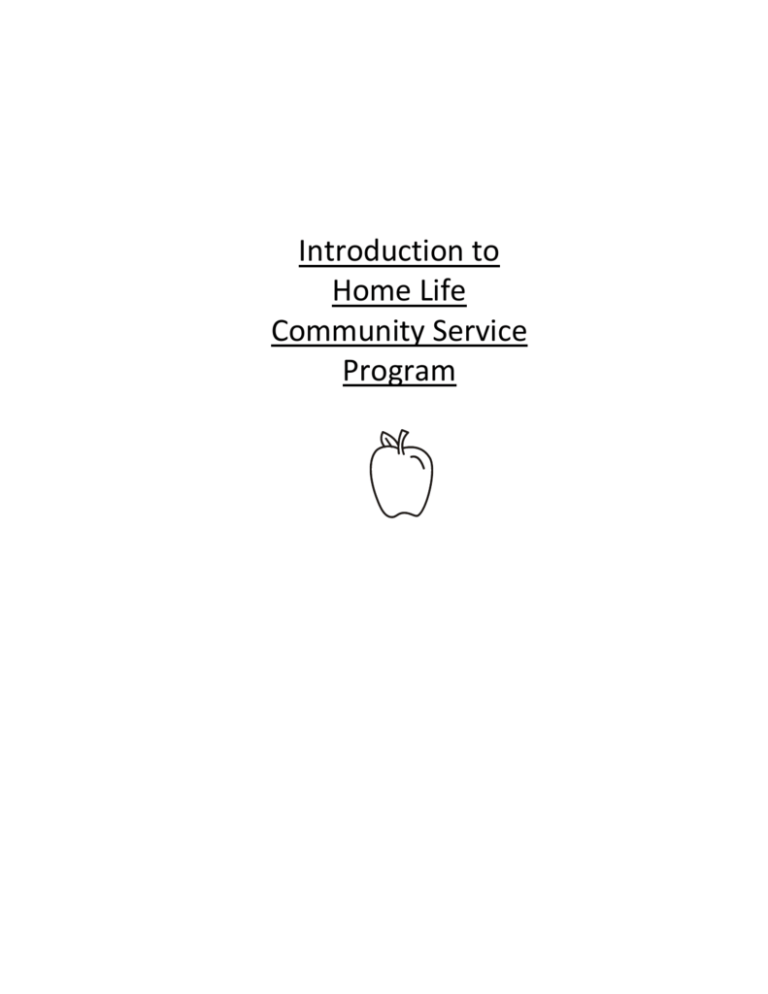
Introduction to Home Life Community Service Program Home Life Community Service Program Table of Contents Overview GFWC Chapter One Then & Now Chapter Two Partnerships 101 Chapter Three Collaborations 101 Chapter Four Reporting Chapter Five Questions Call to Action Ideas from GFWC Home Life Community Service Program Contact Information CHAIRMAN JUNIOR CHAIRMAN Susan Patton Jennifer Honeycutt 1504 Cooper Falls Lane 4120 Old Watkins Road Raleigh, NC 27614 Oxford, NC 27565 919/274-2222 252/483-6180 susanpatton@nc.rr.com honeycutt.jd@pg.com Overview GFWC PROGRAM PRINCIPLES The GFWC Home Life Community Service Program is designed to inform members of issues that affect the well-being of individuals, families, and communities by providing opportunities and resources to meet and address needs through volunteering. The GFWC Home Life Community Service Program strengthens families and communities by creating a better quality of life for all citizens. GFWC members have a rich history of solving problems related to home and communities with a “handson” approach. In the spirit of this tradition, the GFWC Home Life Community Service Program continues to provide resources to identify and address needs, particularly those related to wellness of women, children, the disabled and the elderly; hunger; housing and homelessness; personal finances; and identity theft. PROGRAM GOALS AND OBJECTIVES The goals for the Home Life Community Service Program are listed below in order to assist you in measuring project success and positive change in your communities. The listed objectives further outline how we can build projects that support these goals. Goal 1: To identify needs and educate members and communities to meet those needs with successful and innovative programming that stems from member input. Objective 1.1: To identify needs of individuals, families and the community as a whole. Objective 1.2: To identify and draw attention to the available resources for strengthening families and communities. Objective 1.3: To develop and implement creative projects that promote a healthy lifestyle or increase awareness, prevention, research or treatment of disease; target personal development, especially for women and children; address the issues of hunger, inadequate housing and homelessness; and/or prevent or correct financial difficulties, including identity theft. Goal 2: To integrate the elements of the Home Life Community Service Program in the community by introducing members and communities to partner organizations that improve the lives of those in need. Objective 2.1: To promote informative and creative Home Life projects through partnerships, which benefit recruitment of new members and new clubs, especially Juniorette clubs. Objective 2.2: To help clubs meet the needs of communities with partnerships that promote contests, highlight beneficial projects, and educate members to use those resources available and serve as go-betweens with other groups and community members. Chapter One Then & Now Then Now Departments Community Service Programs Chairman, Junior Chairman + Program Chairman Chairman & Junior Chairman Program Emphasis Partnerships & Collaborations Different Report Form for each Emphasis Partnership & Collaboration Report Forms Only There will be two community service program chairmen for GFWC-NC: Susan Patton and Junior Chairman, Jennifer Honeycutt. The chairmen will be your primary contact for questions, please see the front of this textbook for contact information. Chapter Two Partnerships 101 GFWC Partners are organizations that operate at the national or international level and offer unique and customized services such as project materials, speakers, kits, and/or additional information specifically designed for GFWC clubs to enhance the effectiveness of the GFWC Community Service Programs and Special Projects within their communities. These partners are aware of GFWC clubs’ specific needs and our club structure. Alzheimer’s Association | www.ALZ.org 225 North Michigan Avenue, Floor 17 | Chicago, IL 60601 P: 312-335-8700 | F: 1-866-699-1246 Contact: Lauren Fritz | P: 312-335-5828 | E: Lauren.Fritz@ALZ.org The Alzheimer’s Association is the leading voluntary health organization on a mission to eliminate Alzheimer’s disease through the advancement of research; to provide and enhance care and support for all affected; and to reduce the risk of dementia through the promotion of brain health. Ways to get involved in the fight against Alzheimer’s disease: Increase your knowledge of Alzheimer’s disease and spread awareness by obtaining informational brochures and other promotional materials from the Alzheimer’s Association. Host a fundraising event in support of the 5.3 million Americans living with Alzheimer’s disease. Observe World Alzheimer’s Day on September 21. Join the Alzheimer’s Association for Memory Walk by creating a team or participating as a volunteer. Canine Companions for Independence | www.CCI.org PO Box 446 2965 Dutton Avenue | Santa Rosa, CA 95402 P: 707-577-1700 | P: 866-224-3647 Contact: Bob Bunger | E: BBunger@CCI.org Canine Companions for Independence is a nonprofit agency dedicated to placing highly trained assistance dogs with professional caregivers and people with disabilities, and ensuring the success of the working team through continued follow-up. Canine Companions offers a variety of volunteer opportunities, from being a puppy raiser to sponsoring fundraising and community awareness events. Supporting Canine Companions programs promotes independence for persons with disabilities. GFWC is working with Canine Companions for Independence on its Wounded Veteran’s Initiative. Canine Companions for Independence has provided many assistance dogs to injured service men and women who are returning from the Iraq and Afghanistan wars. For a veteran making a new start putting their life back together from an injury, an assistance dog can provide the help they need to regain independence. GFWC members can: Increase club and community awareness about assistance dogs and their benefits, including making wounded veterans in their communities aware of the services offered by Canine Companions. Set up an information booth at a health fair, mall, or school to distribute literature from Canine Companions. Request printed materials or the new Canine Companions video “Making Miracles Happen” and use them at a club or community meeting. Visit Canine Companions’ website www.CCI.org for video and public service announcements you can share. Encourage club and community involvement in Canine Companions activities. Become a Canine Companions puppy raiser. Start a fund to provide one of nine sponsorship opportunities. Easter Seals | www.EasterSeals.com 230 West Monroe, Suite 1800 | Chicago, IL 60606 P: 312-221-6827 ext. 7136 | P: 312-551-7136 Easter Seals provides services to ensure that all persons with disabilities have equal opportunities to live, learn, work, and play. Easter Seals assists more than one million children and adults with disabilities and their families annually through a nationwide network of more than 550 service centers. Each center provides top quality, family focused, and innovative services tailored to meet the specific needs of the community it serves. Contact Easter Seals for information about sewing occupational therapy vests for children. Increase club and community awareness about Easter Seals and services for individuals with autism and other disabilities. Raise funds for Cartridges for Kids Recycling, an Easter Seals recycling program that pays schools and nonprofit organizations for empty laser and inkjet cartridges, used cell phones, laptops, PDAs, and iPods. Support Easter Seals with donations. Habitat for Humanity International | www.Habitat.org 121 Habitat Street | Americus, GA 31709 P: 229-924-6935 ext. 3079 | Toll Free: 800-HABITAT (422-4828) | F: 229-924-0577 Habitat for Humanity is a nonprofit, ecumenical housing ministry that seeks to eliminate poverty, housing, and homelessness from the world, and to make decent shelter a matter of conscience and action. Founded in 1976, Habitat for Humanity has built approximately 25,000 houses around the world, providing more than one million people with safe, decent, affordable shelter. Habitat invites people from all walks of life to work together to help build houses with families in need. Habitat for Humanity’s Women Build volunteer program is an option for club members who want to learn construction skills and make a difference by building homes and communities. Women Build projects are regularly held by Habitat affiliates across the United States, and by Habitat organizations around the world. GFWC members can: Call the Habitat Help Line at 800-422-4828 for the name and location of the Habitat affiliate nearest you. Contact your local Habitat for Humanity affiliate for information regarding possible volunteer activities. Celebrate Women’s Build Week. Devote at least one day to the effort to eliminate poverty housing. To learn more, go to www.Habitat.org/wb. Increase club and community awareness about Habitat for Humanity. Volunteer to work on a Habitat for Humanity house in your community. Collaborate with other service organizations in building a Habitat for Humanity house in your community. March of Dimes Birth Foundation | www.MarchOfDimes.com 1275 Mamaroneck Avenue | White Plains, NY 10605 P: 914-997-4541 | F: 914-997-4686 Contact: Rebecca Smith | E: RSmith@MarchOfDimes.com The March of Dimes is a nonprofit, voluntary health organization committed to improving the health of babies by preventing birth defects, premature birth and infant mortality. The March of Dimes helps moms have full-term pregnancies and healthy babies. And if something goes wrong, they offer information and comfort to families. GFWC and March of Dimes have worked together on improving the health of babies for over 65 years. Current March of Dimes projects include: Baskets for Babies: GFWC members can provide assemble a basket of much-needed items, including a donation to the March of Dimes, for families in their local Neonatal Intensive Care Unit by participating in the GFWC signature Baskets for Babies Program. Items will provide support and comfort to moms, dads, siblings, and babies in the NICU. The March of Dimes will recognize local GFWC members for their participation in the Program. March for Babies: Join one of America’s favorite walking events. When GFWC walks in March for Babies, we’ll be giving hope to the more than half a million babies born too soon each year. The money we raise supports programs in your communities that help moms have healthy, full-term pregnancies. To find an event in your community, start, or join a team, go to www.MarchOfDimes.org/GFWC. Prematurity Awareness Month & Day: Prematurity has been escalating steadily and alarmingly over the past two decades. One out of eight babies is born prematurely in the United States. Preterm delivery can happen to any pregnant woman. Get involved with prematurity awareness efforts in your community. GFWC members can contact the March of Dimes at the address above to get involved so that one day every baby will be born healthy. Teen2Teen: Youth play a critical role in March of Dimes’ mission by raising funds and by educating themselves and their peers about important health messages that can affect the outcome of pregnancies in the future. Use March of Dimes’ youth curriculum in your Juniorette club or provide the materials to a local high school to help elaborate on the messages in the Teen-2-Teen youth health program www.MarchofDimesYouth.org Increase awareness to issues related to birth defects, premature birth, and infant mortality. Invite health experts to a club or community meeting to discuss various health topics such as the necessity of pre- and post-natal care, healthy problems, and risks surrounding teen pregnancy and the use of drugs and alcohol during child-bearing years. Encourage club and community members to become involved in the work of the March of Dimes. Observe Prematurity Awareness Month each November, and Prematurity Awareness Day, November 17. National Heart Lung and Blood Institute | www.NHLBI.NIH.gov/Educational/Hearttruth/ NHLBI Health Information Center | Attention: Web site | PO Box 30105 | Bethesda, MD 20824-0105 E: NHLBIInfo@NHLBI.NIH.gov | P: 301 592 8573 | TTY: 240-629-3255 | F: 240-629-3246 To make women more aware of the danger of heart disease, the National Heart, Lung, and Blood Institute and partner organizations are sponsoring a national campaign called The Heart Truth®. The campaign’s goal is to give women a personal and urgent wakeup call about their risk of heart disease. The campaign is especially aimed at women ages 40 to 60, the age when a woman’s risk of heart disease starts to rise. But its messages are also important for younger women, since heart disease develops gradually and can start at a young age-even in the teenage years. Older women have an interest too—it's never too late to take action to prevent and control the risk factors for heart disease. Even those who have heart disease can improve their heart health and quality of life. GFWC members can: Download the Heart Truth Online Toolkit, which contains all of the information, ideas, and materials you need to plan your own Heart Truth event. National Osteoporosis Foundation | www.NOF.org 1150 17th Street NW, Suite 850 | Washington, DC 20036 P: 800-231-4222 | F: 202-223-2237 Contact: Kris Blanchette | E: Kris.Blanchette@NOF.org | P: 202-721-6376 The National Osteoporosis Foundation is the leading consumer and community-focused health organization dedicated to the prevention of osteoporosis and broken bones, the promotion of strong bones for life and the reduction of human suffering through programs of public and clinician awareness, education, advocacy and research. Together NOF and GFWC are working on: A Gift from Mothers to Daughters: GFWC members can host a luncheon celebrating one of the most important gifts that generations of women have passed on to their families: the gift of knowledge about health – especially information about lifelong bone health and osteoporosis prevention, detection and treatment. Find our more at www.NOF.org/Gift. Strong Voices for Strong Bones®: Join the thousands of strong voices for strong bones in the fight against osteoporosis by becoming a member of the Healthy Bones Advocacy Network. We give you the tools to reach out to policy makers to highlight the importance of osteoporosis and bone health and help advance NOF’s public policy goals. Join now at www.NOF.org/Advocacy. Pearls of Strength®: Consider purchasing a Pearls of Strength® bracelet made of genuine, freshwater, white, cultured 8-9mm with a sterling silver heart clasp—a beautiful way to remind those you love to cherish their bones throughout their lifetime. Funds raised from the sale of Pearls of Strength® bracelets help NOF promote its programs of awareness, education, advocacy, and research. Steps for Strong Bones®: Start taking Steps for Strong Bones and join a national effort to improve the nation’s bone health. GFWC members that join Steps for Strong Bones are helping to bring hope to the estimated 44 million Americans who have osteoporosis or low bone density, placing them at increased risk for the disease. The money raised helps NOF promote strong bones for life through programs of public and clinician awareness, education and advocacy. Find an event or join at www.NOF.org/Steps. Invite health experts to a club or community meeting to discuss various health topics such as proper nutrition and exercise for lifelong bone health, the importance of osteoporosis testing, risk factors for osteoporosis, and fall prevention measures you can take and the negative impact of smoking, excessive drinking and inactivity on bone health. Observe National Osteoporosis Awareness and Prevention Month in May every year. Contact NOF for campaign information that can be used to increase awareness of osteoporosis and promote healthy bones in your community. Order a free resource packet from the National Osteoporosis Foundation by contacting the NOF representative. Women’s Institute for a Secure Retirement | www.WiserWomen.org 1146 19th Street NW, Suite 700 | Washington, DC 20036 P: 202-393-5452 Contact: Lara Hinz | E: Info@WiserWomen.org The Women’s Institute for a Secure Retirement is a nonprofit organization that helps women, educators and policymakers understand the important issues surrounding women’s retirement income. WISER works to provide low- and moderate-income women with basic financial information aimed at helping them take financial control over their lives. We also work to increase awareness of the structural barriers that prevent women’s adequate participation in the nation’s retirement systems. Learn more at www.WiserWomen.org. Together, WISER and GFWC are working to arm women’s clubs across the country with unbiased and actionable financial education for their constituents. All of our publications, fact sheets and newsletters are available for download online. Contact Lara Hinz for bulk orders. Available publications include: A Simple Guide to What Everyone Needs to Know About Money and Retirement (available in English and Spanish) Seven Life Defining Financial Decisions (available in English and Spanish) Making Your Money Last a Lifetime-Why You Need to Know About Annuities Your Future Paycheck: What Women Need to Know About Pay, Social Security, Pensions and More Don’t Run With Your Retirement Money: Understanding Your Resources and How Best to Use Them WISER is available to train GFWC leaders to conduct financial education workshops for their local members. The workshop, Your Future Paycheck, focuses on the unique needs of women in retirement, sources of retirement income, and investment basics. Please contact Lara Hinz if you are interested in the training. An opportune time of year to conduct financial education workshops or advertise the availability of our financial education publications is during America Saves Week (February), National Consumer Protection Week (March), International Women’s Day (March), National Financial Literacy Month (April), Older Americans Month (May), National Retirement Planning Month (July) and National Savings Week (September). Women across the country need help to protect themselves from a life of poverty in retirement. Together, the GFWC and WISER can help steer thousands of women onto a safer path. Chapter Three Collaborations 101 In the GFWC Home Life Community Service Program-Collaboration, GFWC clubs will: Research, plan, and implement projects, programs, and advocacy based on its interests and the needs that the club members believe are important. This is the club members’ opportunity to think out of the box and do it their way. Report. It is imperative that clubs report the projects that they have developed so that as an organization, we can better see where our members’ interests lie and those statistics can be used in working with and recruiting new GFWC Partners, grants, and advocacy opportunities. Reporting is also important so that we can highlight and share your club’s creativity and interests with our membership so that they can also be inspired to either implement a similar project or use it for inspiration for their own. Explore examples of what your fellow GFWC clubs have done around the country to implement projects related to home life in their own communitiesGFWC Woman’s Club of Springfield (Virginia) initiated a Layette Project several years ago in response to the growing need of the local hospitals to provide basic supplies for mothers and their newborn babies. The club has continued to enthusiastically support this program and has been working with Fairfax Hospital and Alexandria Hospital to meet the needs of their new mothers. Members donated onesies, diapers, bottles, socks, receiving blankets, and burp cloths. In addition, members crocheted, knitted, and sewed blankets and quilts. The social workers at the hospitals expressed gratitude for the club’s interest in meeting the needs of these new mothers. GFWC/MFWC Florentine Club of Florence (Mississippi) worked to enhance the quality of life for the mentally challenged patients at the State Hospital, for whom there were limited government funds to provide recreational and personal growth opportunities. In coordination with local merchants and artists, volunteers assisted with several unique fundraisers including a linen sale, jewelry sale, and medical uniform sale. The club also donated money for a fountain (in memory of a deceased member) and made other improvements to the grounds. Members provided magazines, clothes, and toiletries to patients throughout the year. At Christmas, they sponsored a party and provided gifts for the residents. GFWC/IFC ESO Tri County Woman’s Reading Club (Indiana) continues to increase the aid it gives to the local food pantry. Members help stock the shelves, pack bags of select food items that are distributed to needy families, and help prepare kits of food for special occasions. Volunteers prepare food for Thanksgiving and Easter, and Kid kits to ensure that families and children have adequate food for the holidays. The club members also bring food and paper products to meetings, which are then donated to the food pantry. Remember, Collaboration projects are those that meet the needs of your individual communities and is your opportunity to continue those traditional projects as well as think outside of the box! GFWC Resources American Cancer Society 1599 Clifton Rd. NE | Atlanta, GA 30329 P: 800-ACS-2345 | W: www.americancancersociety.com American Heart Association 7272 Greenville Avenue | Dallas, TX 75231 P: 1-800-AHA-USA-1|W: www.heart.org Heavenly Hats Foundation 2325 Pamperin Rd. Suite 3 | Green Bay, WI 54313 P: 920-434-4151 ext. 1400 | F: 920-434-1352 | W: www.heavenlyhats.com National Breast Cancer Coalition 1101 17th Street, NW, Suite 1300 | Washington, DC 20036 P: 800-622-2838 |F: 202-265-6854 | W: www.stopbreastcancer.org National Organization on Disability 1625 K Street NW, Suite 802 |Washington, DC 20006 P: 202-349-0863 | W:www.nod.org Selected North Carolina Resources Girls on the Run GOTR International 120 Cottage Place | Charlotte, NC 28207 P: 704.333.2566 | W: www.girlsontherun.org Hospice Foundation of America 1710 Rhode Island Ave, NW Suite 400 | Washington, DC 20036 P: 202-457-5811 or 800-854-3402 | F: 202-457-5815 | W: www.hospicefoundation.org Special Olympics of North Carolina 2200 Gateway Center Blvd Suite 201| Morrisville, NC 27560-9122 P: 919-719-7662 | W: www.sonc.net North Carolina Department of Health and Human Services P: 919-733-4534 | W: www.ncdhhs.gov Advocates for Children Action for Children North Carolina 1300 St. Mary’s Street, Suite 500 | Raleigh, NC 27605-1276 P: 919-834-6623 | F: 919-829-7299 | W: www.ncchild.org Boys and Girls Homes of NC, Inc 400 Flemington Drive | Lake Waccamaw, NC 28450 P: 910-646-3080 | W: www.boysandfilshomesofnc.com Children’s Home Society 604 Meadow Street | Greensboro, NC 27405 P: 336-274-1538 | W: www.chsnc.org Identity Theft National Consumers League W: www.nclnet.org Consumer Privacy Guide W: www.consumerprivacyguide.org Developmentally Disabled Centers in North Carolina Black Mountain Center Old US Hwy 70 | Black Mountain, NC 28711 Murdoch Center 1600 East C Street | Butner, NC 27509 J. Iverson Riddle Development Center 300 Enola Road | Morganton, NC 28655 Caswell Center 2415 W. Vernon | Kinston, NC 28501 O’Berry Center 400 Old Smithfield Road | Goldsboro, NC 27530 Chapter Four Reporting Following are samples of the Home Life Community Service Program Reports for 2010-2012. Please copy and use the forms in the CSP Section of the Administration Book. More Information on Reporting will be presented at your District Fall Meetings! CALL TO ACTION Ideas from GFWC We have outlined ideas to help you in attaining the goals and objective that have been set forth in the GFWC Home Life Community Service Program, including ways to educate yourself, inform others, and create change. Educate Yourself Meet with civic leaders and those who provide services to the community to assess and quantify specific needs of local citizens. Research problems in your community that are largely unaddressed, and identify the underserved in your area. Request information from GFWC Partners and resources, and make use of the information and assistance they provide. Learn about nonprofit organizations with whom your club might work or to whom your club may donate funds by visiting www.GuideStar.org. Visit Canine Companions’ website www.CCI.org and request printed materials or the new Canine Companions video “Making Miracles Happen.” Contact the Habitat Help Line at 800-422-4828 for the name and location of the Habitat for Humanity affiliate nearest you. Visit www.Habitat.org/WB to learn more about Women’s Build Week. Investigate your community’s adherence to the Americans with Disabilities Act and accessibility for persons with disabilities. Visit www.WebMD.com, www.MayoClinic.com, www.InteliHealth.com, www.APTA.org, and http:MedlinePlus.gov for general wellness information. Visit www.ACOG.org for information regarding women’s health. The Find-A-Physician tool lets visitors search from a database of 40,000 OB-GYNs by city and offers women’s health pamphlets. Learn basic facts about breast cancer risk factors, discover why breast cancer awareness is important, and find screening options. Order the free Spotlight on Shingles kit developed by Merck, in conjunction with the American Pain Foundation. Visit www.SpotlightOnShingles.com to order. Learn about symptoms of stroke that are particular to women, symptoms that may be different than those for men. Contact the local American Heart Association for materials and speakers. Investigate www.WomensHeartFoundation.org, www.WomenHeart.org, and www.AmericanHeart.org to learn more about heart disease, the number one killer of women. Investigate self-worth, the characteristics of both the healthy and the unhealthy variety at www.toolsforlivinglife.com/self_esteem.htm and www.Self-Esteem-NASE.org. Visit websites for weight loss assistance, including: www.WeightWatchers.com and www.Prevention.com. Visit www.PandemicFlu.gov to find information, tools, and support that will assist your club, community, and family in preparing. Visit www.WiserWomen.org to download information about the important issues surrounding women’s retirement income. Visit www.SocialSecurity.gov to obtain information on retirement planning and calculation of benefits; assistance for widows, widowers, and other survivors; and instructions regarding name changes due to marriage, divorce, and other life-changing events. Learn about the crime of identity theft by visiting www.FTC.gov/bcp/edu/microsites/idtheft or www.IDTheftCenter.org. Inform Others Share information obtained from GFWC Partners and resources with members and the community. Provide local working mothers and/or single parents an opportunity to network and share resources. Organize or participate in health fairs and forums. Use club members who are health care professionals and fitness experts as presenters. Create a resource list of local clinics and health centers for underserved women. Distribute the list at shelters, places of worship, and other appropriate public places. Educate members and community about the availability of shingles vaccine. Research and discuss the impact that healthy self-worth has on club meetings and activities. Invite an identity theft expert to speak at a club meeting. Contact the Identification Theft Resource or Center’s Speakers Bureau to see if there is a speaker in your area. Organize financial workshops for groups such as retirees, single parents or college students. Create Change Work with local food banks and homeless shelters to provide needed donations, stock shelves, and other volunteer services. Partner with a local nursing home or mental health facility to enhance the quality of life for the elderly and disabled. Partner with local hospital to present stroke outreach programs. Host a stroke survivor or a health professional at a club meeting to talk about the signs and symptoms of stroke and the need to seek immediate treatment. Download the free Heart Truth kit “The Heart Truth: A Speaker’s Kit” and hold your own Red Dress event to raise awareness of heart health. Start an exercise group in your club, then initiate a weight loss challenge in your club and keep track of pounds lost Participate in the annual Accessible America competition to recognize local communities for their efforts to include people with disabilities. Important Dates Plan projects and events around days, weeks, and months of celebration and commemoration in the GFWC Home Life Community Service Program. January National Blood Donor Month January Cervical Cancer Awareness Month January National Birth Defects Prevention Month January National Poverty in America Awareness Month February American Heart Month February America Saves Week February Women’s Heart Week, first week of the month February 4, 2011 National Wear Red Day February 3, 2012 National Wear Red Day March American Red Cross Month March National Consumer Protection Week March 24 World TB Day April Cancer Control Month April National Financial Literacy Month April 7 World Health Day May America Stroke Month May Mental Health Month May National Arthritis Month May Older Americans Month July National Retirement Planning Month August National Immunization Awareness Month September National Savings Week September Ovarian Cancer Awareness Month September National Infant Mortality Awareness Month September Cholesterol Awareness Month September 21 World Alzheimer’s Day September 29, 2010 National Women’s Health and Fitness Day October Breast Cancer Awareness Month October Sudden Infant Death Syndrome Awareness Month October National Mammography Day (third Friday in October each year) November National Alzheimer’s Disease Month
